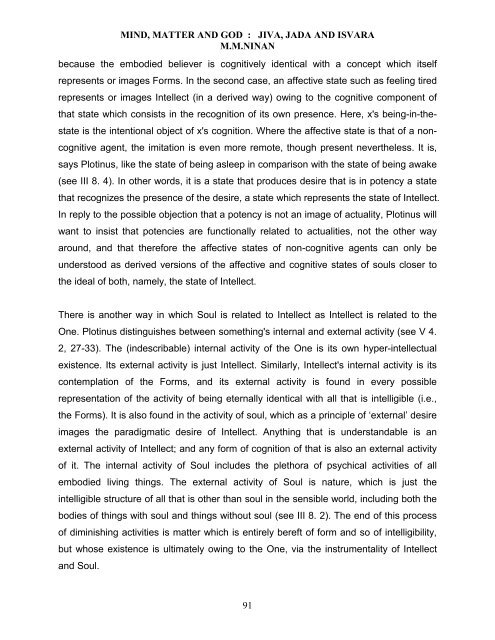Jiva
Create successful ePaper yourself
Turn your PDF publications into a flip-book with our unique Google optimized e-Paper software.
MIND, MATTER AND GOD : JIVA, JADA AND ISVARA<br />
M.M.NINAN<br />
because the embodied believer is cognitively identical with a concept which itself<br />
represents or images Forms. In the second case, an affective state such as feeling tired<br />
represents or images Intellect (in a derived way) owing to the cognitive component of<br />
that state which consists in the recognition of its own presence. Here, x's being-in-thestate<br />
is the intentional object of x's cognition. Where the affective state is that of a noncognitive<br />
agent, the imitation is even more remote, though present nevertheless. It is,<br />
says Plotinus, like the state of being asleep in comparison with the state of being awake<br />
(see III 8. 4). In other words, it is a state that produces desire that is in potency a state<br />
that recognizes the presence of the desire, a state which represents the state of Intellect.<br />
In reply to the possible objection that a potency is not an image of actuality, Plotinus will<br />
want to insist that potencies are functionally related to actualities, not the other way<br />
around, and that therefore the affective states of non-cognitive agents can only be<br />
understood as derived versions of the affective and cognitive states of souls closer to<br />
the ideal of both, namely, the state of Intellect.<br />
There is another way in which Soul is related to Intellect as Intellect is related to the<br />
One. Plotinus distinguishes between something's internal and external activity (see V 4.<br />
2, 27-33). The (indescribable) internal activity of the One is its own hyper-intellectual<br />
existence. Its external activity is just Intellect. Similarly, Intellect's internal activity is its<br />
contemplation of the Forms, and its external activity is found in every possible<br />
representation of the activity of being eternally identical with all that is intelligible (i.e.,<br />
the Forms). It is also found in the activity of soul, which as a principle of ‘external’ desire<br />
images the paradigmatic desire of Intellect. Anything that is understandable is an<br />
external activity of Intellect; and any form of cognition of that is also an external activity<br />
of it. The internal activity of Soul includes the plethora of psychical activities of all<br />
embodied living things. The external activity of Soul is nature, which is just the<br />
intelligible structure of all that is other than soul in the sensible world, including both the<br />
bodies of things with soul and things without soul (see III 8. 2). The end of this process<br />
of diminishing activities is matter which is entirely bereft of form and so of intelligibility,<br />
but whose existence is ultimately owing to the One, via the instrumentality of Intellect<br />
and Soul.<br />
91


















